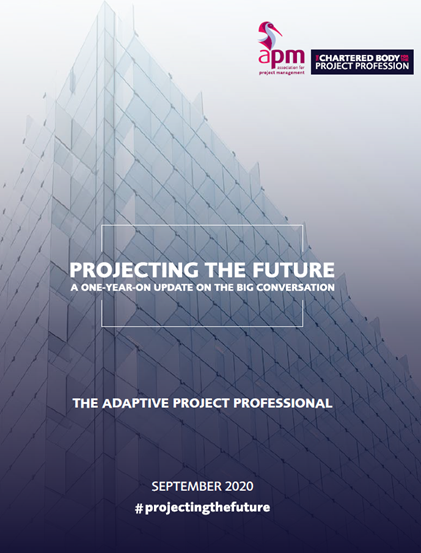
PROJECTING THE FUTURE SERIES
The Adaptive Project Professional: one year on
In June 2019, Association for Project Management launched Projecting the Future as a ‘big conversation’ about the future of the project profession.
One year on, we have drawn on what you told us during the conversation, and the conclusions that have emerged. Our report sets out to shape the future of the profession – with selected action steps for stakeholders across the profession.
After the last 12 months of the big conversation, we believe now is the time to focus on the adaptive project professional. Change is set to be the defining characteristic of the decade ahead – technological, social and environmental – and the project profession will be at the heart of creating and delivering that change. Adaptability will be key.
Our report, The Adaptive Project Professional, sets out a series of ideas to help shape the future of project management and gives recommendations for action.
What we did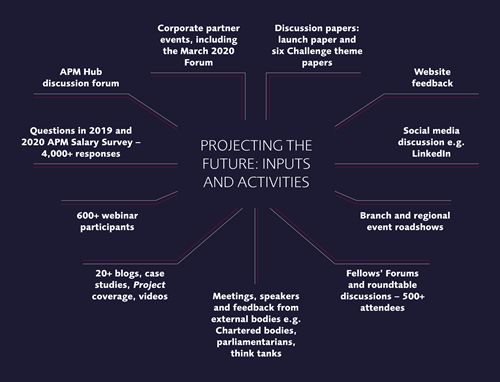
Projecting the Future was created as a ‘big conversation’: a listening exercise, intended to draw together input from a wide variety of stakeholders and sources. Our approach was content-led, with a series of papers addressing six challenges which we identified as pivotal to the profession’s future.
With 2,000 print copies distributed and more than 18,000 views online, the Challenge papers generated continued discussion across APM’s social media channels, as well as at numerous APM events, conferences and webinars throughout 2019-20. They also underpinned targeted stakeholder engagement, especially with organisations outside APM’s normal channels, reflecting the need to build the profession’s profile more broadly.
What we asked
-
What role should the project profession play in business and society over the next decade?
-
What will project management look like in the future?
-
What skills and mindsets will be needed by project professionals in the future?
-
How should we manage the drivers of change?
-
What is the future role of APM?
-
Who else will help us shape change?
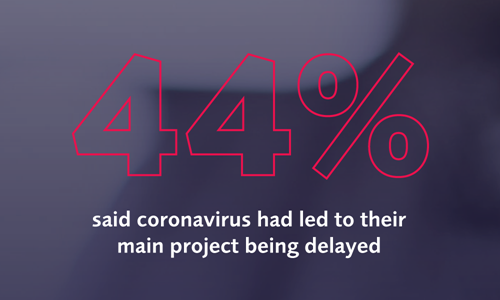
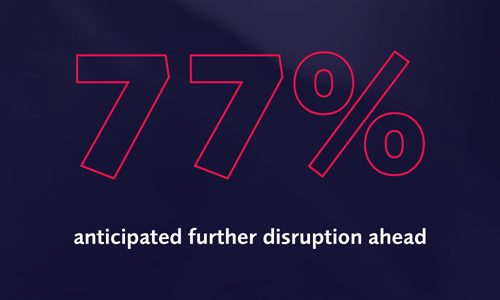
What you told us
“Adaptability is key. Organisations want to know how other sectors manage their projects – knowledge transfer and reach back is important. We need to recognise that there isn’t ‘one size fits all’ – e.g. different levels of project plans. Project managers should feel empowered to challenge [existing] ways of working.”
“The drivers of change will evolve. We will need to evolve the profession with them – and it is incumbent on us to recognise what skills and mindsets will need to be. With an open mindset, and a lifelong learning attitude, we will always be able to adapt.”
“Modern project management is a huge game of whack-a-mole, so having the prioritisation skills to make the right decisions quickly and to be able to resolve challenges quickly are essential.”
“We have to be the leaders of change, defining governance of change projects, helping the other professions in their changes in the new digital world. We need to work with the drivers of change not manage them, and apply discipline and rigour to the change process.”
Previous challenge papers
Projecting the Future examined six of the major drivers of change for the project profession. You can read the feedback paper or catch up on the discussion papers for each area:

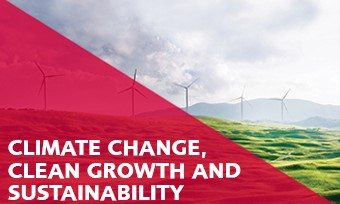


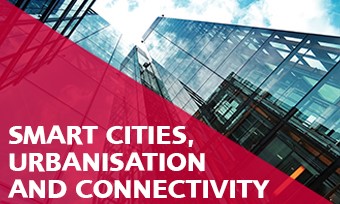

Eight ideas to shape the future
‘The Adaptive Professional’ paper sets out eight ideas to help the profession thrive:
Project management’s future: the adaptive profession
In an era of unprecedented technological, social and environmental change, the project profession will be the profession at the heart of creating and delivering change. To deliver change successfully, project management’s future is as the adaptive profession.
Adaptive professionals need to be responsive to the shifting contexts in which they work. They need to be learning continually. They need strong meta-competencies – such as resilience, anticipating and creating change, building diverse teams.
Rising skills needs include the ability to use and implement new technology, for example, data analytics; and more people-centred or ‘soft’ leadership and people skills, communications, collaboration, and managing increasingly complex stakeholder engagement.
Building the profession’s pipeline – from starter to charter
The project profession needs to build a strong talent pipeline by embedding new routes into the profession for young entrants and pathways for more mature, mid-career switchers including returners to work or ex-service personnel.
Employers and policy makers should build on the relatively new Project Apprenticeships (including at degree level) and other vocational routes, where there are hugely positive signs about their effectiveness in developing new entrants. Efforts to build awareness of the project profession as an increasingly desirable career should be redoubled, with collaboration between APM, schools, colleges and universities – with emphasis less on the processes of project management and more on the transformational, inspirational, benefits of projects.
Increasingly, the pathway to chartered makes this a career for many who see the value in a profession that runs through the heart of so many organisations and varied sectors.
Strengthening the culture of professionalism through life
In the context of longer working lives and likely technological disruption to work, we urgently need improved support for professionals to train, retrain, and keep learning throughout their careers.
Individuals need to recognise their own responsibility for investing in their learning and development throughout their careers, but employers must also take responsibility for developing their people, helping them adapt to changing economic needs and new ways of working. Policy makers should take an ambitious and creative approach to supporting this culture of professionalism: this may require greater flexibility in skills funding, the creation of skills accounts which empower individuals to manage their own learning, and more support for helping retrain for different roles.
A seat at the table – shaping strategy as well as delivery
The Projecting the Future debate has demonstrated the desire of project professionals to have a more influential role in shaping the strategy of projects, and the overall strategy of organisations running projects.
In organisations with significant portfolios of projects, there should be a seat at the top table for those responsible for projects – perhaps building on the concept of the chief project officer (CPO), or by bringing more project management experience into the boardroom – to ensure that the importance of projects is recognised as a critical part of strategic development in today’s fast-changing environment.
The development of Chartered (ChPP) and the increasing number of charter holders provides a leadership cohort which can give the profession greater visibility and parity of esteem with other professions for the first time. Going further, there is a need to identify the attributes and training needs for aspiring CPOs – what are the leadership characteristics, skill and attributes that project managers need to be leaders? – as well as to improve the recognition of project leadership more widely.
Project professionals also have an obligation to stand up, call out and challenge poor practice when they see it.
Collaboration with other organisations – a challenge
Project management has a core set of skills and expertise but, as a profession, it is important that we exchange with other professions, employers and other organisations to take into account new and innovative ways of training, and to build a shared understanding of how best to improve the delivery of projects.
Collaboration will be essential. What possible collaborations could help to broaden project professionals’ competences beyond their core technical project management competences – for example in general leadership, digital skills, or personal capabilities such as resilience and managing mental health? On what else, and how, can the profession best collaborate with others? Let us know your thoughts.
Promoting the profession and building its impact
We need to continue to champion the virtues of project management and showcase its influence as an agent of change working across the economy and society.
APM has a key role to play in this area and should act as an umbrella for activity that includes corporates, government and other bodies. Chartered Project Professional status (ChPP) is key: it provides the profession with a distinct identity and sends a signal to both other professions and the wider community about the project profession’s commitment to high standards.
What ways can we use the chartered brand to support the raising both of standards and the profile of project management globally? How can we most effectively – whether it is individuals, organisations and employers or APM – support the project professional brand, particularly Chartered? And how can we put it on a global footing?
Building the evidence base for what works
There is a widespread appetite for an improved evidence base on effective techniques in project management and for sharing insights on what works in a rapidly changing world. It is recognised that too many projects fail to deliver on the desired outcomes or overrun on time and budgets.
How are the conditions for project success evolving, and how can their adoption be promoted more widely? How can the profession learn to the draw the right lessons from experience when it faces a complex and chaotic world, where past ‘proven’ solutions might not work a second time? How can government use, and contribute to, an expanded evidence base as it seeks to raise standards of project management in order to deliver on its policy agenda?
Embedding sustainability in projects
If the UK is to deliver on its net-zero target by 2050, project professionals will have a significant role to play, both in projects transitioning to a cleaner, greener economy, and in mitigating and adapting to the effects of climate change.
Sustainability needs to be an integral part of project management’s toolkit, part of the thinking for new projects and retrofitted into existing projects where relevant. The way that the profession builds decarbonisation and net zero planning into the heart of existing and future projects will be a key test of its benefit to society.
Project professionals
- Build an adaptive mindset. In a VUCA world, you need to be ready to shape change, and to continually evolve and grow – personally and in what you deliver through your work. Develop ‘meta competencies’ – the over-arching skills that are separate from, but supportive of, the specific skills needed to do the job. These include the ability to continually learn, to adapt, being resilient, and anticipating and creating change.
- For many professionals, CPD and learning should focus on two key areas of skills which are expected to be critical in the next 5-10 years:
- New technology. Develop your understanding of, and ability to use, new technology; both to increase effectiveness and productivity in how you work, and in how technology can help meet client and end-user needs.
- Leadership and people skills. In a complex world, interactions with others are critical: project professionals need to go beyond classic technical project management skills and build the ability to engage with, and provide leadership to, varied project stakeholders.
- Step up to lead. Project professionals who aspire to lead projects need to have curiosity, be prepared to think imaginatively, and develop ‘out of the box’ thinking. Building on their unique core expertise and technical skills, project professionals should develop a broader perspective on project and organisational aims, and how they can be achieved. Shape strategy not just delivery. Developing and leading more diverse teams will be crucial in the future, as will communication skills.
Organisations
- Bring project expertise more into the strategic discussion. For organisations with significant portfolios of projects, there should be a stronger voice for projects in the C-suite or at decision-making level. This may mean developing the notion of a Chief Project Officer (CPO), or exploring the potential for greater project expertise on boards. The aim is to improve results by ensuring that project expertise is part of deciding what to do – not just how it can be done.
- Recognise the pivotal role played by project professionals in developing strategy and the initiation of projects – so crucial to their success. Support the development of project professionals within the organisation and ensure they are central to the organisation’s operating environment.
- Maximise project success rates by ensuring that the conditions for project success are increasingly embedded in organisations using the 12 key factors identified by APM. Leading organisations should support APM’s forthcoming review of these factors, which will be an important contribution to the evidence base on effective
project management. - Commit to developing a diverse talent pipeline for the future through investment in project apprenticeships and supporting APM activity around student membership.
- Support those professionals who are further on in their careers in their continuing learning and professional development through support for CPD and qualifications, helping to make them as relevant as possible to the changing challenges of work. Make better use of experienced professionals’ strengths, for example through mentoring, non-executive roles on project steering boards, or in project reviews and gateways.
- Organisations should improve how the benefits of projects, including social and environmental impact, are communicated and shared.
Policy makers and influencers
- Ensure that employers can create more opportunities for new entrants to the project profession by continuing to support the relatively new apprenticeships and raising awareness of the project profession’s increasing relevance in a world where project are the means by which change is delivered. This should build on the highly encouraging early evidence from the first cohorts of project apprenticeships. Creating greater flexibility in how the apprenticeship levy can be used could also support more education leavers in getting into work.
- Support a culture of project professionalism through life by enhancing support for professionals in returning to education or training throughout life, recognising that today’s professionals are likely to face job disruption throughout their careers. This may mean developing policies such as skills accounts, and turning Jobs Centres into Jobs & Skills Hubs, as proposed by the CBI. The economic disruption created by the coronavirus pandemic creates a moment of opportunity to kick-start this new approach to skills.
- Support government’s ability to act as a smart client for major infrastructure. Government should support the Infrastructure and Projects Authority’s (IPA) current programme to strengthen government’s own project capacity. If government is to deliver on its ambitious agenda for national infrastructure, it also needs to support industry in achieving higher productivity levels. More widely, it should build the capacity of the project profession within government and key public services including health.
Association for Project Management
- Explore the potential for a skills audit across the UK economy, to establish the current skills base within the project profession and identify opportunities and gaps against future needs, providing a panoptic view on the future needs of our profession.
- Redouble our outreach programmes to schools, colleges and universities, building awareness of the project profession as an increasingly desirable career which runs through the heart of so many varied sectors and organisations.
- Undertake a major review of our professional competence framework, to support the development of the adaptive profession. Starting in autumn 2020, this work will link into a review of CPD provision, ensuring it is relevant and responsive to individual and organisational needs. To do this successfully, we need input from the wider profession, particularly from employers.
- Support work to improve perceptions of the project profession and establish the need for – and capacity of – the profession to take a seat at the top table of organisations. We will link into similar work being undertaken by the UK government under the aegis of the Infrastructure and Projects Authority (IPA).
- Work with other organisations to promote the profession and its impact, exploring where collaborations would be of most benefit.
- Use the Chartered brand to support the raising of standards, and the profile of project management, globally.
- To build the evidence base of what works, APM will update its influential ‘conditions for project success’ research from 2015, beginning in 2020. APM has also commissioned research on key topics such as the impact of technology, and will continue to work with partners to generate robust and practical research insights on what works.
- Building on the climate change statement we issued in early 2020, we will roll out a major multi-part climate change action plan, through which we will work in cooperation with the wider profession to support them in embedding sustainability in projects and delivering on net zero.

